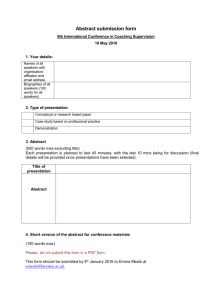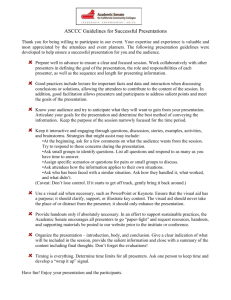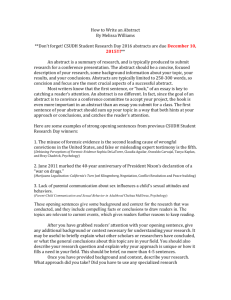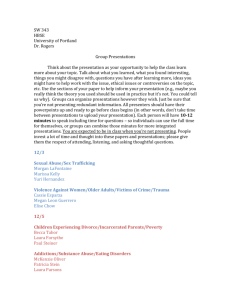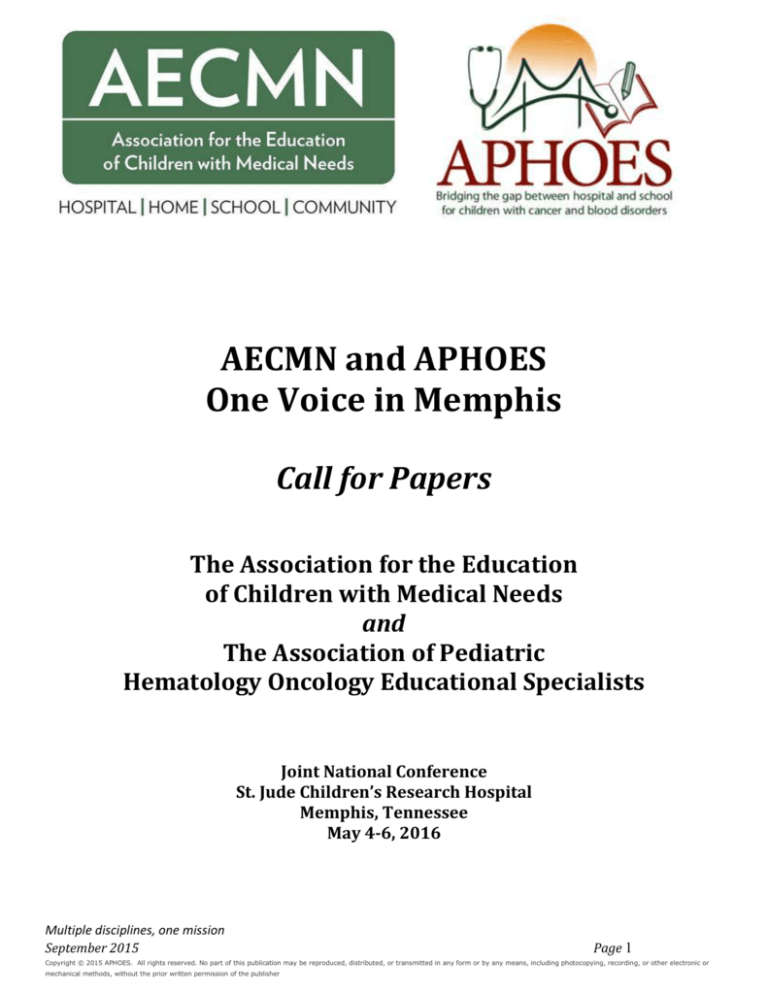
AECMN and APHOES
One Voice in Memphis
Call for Papers
The Association for the Education
of Children with Medical Needs
and
The Association of Pediatric
Hematology Oncology Educational Specialists
Joint National Conference
St. Jude Children’s Research Hospital
Memphis, Tennessee
May 4-6, 2016
Multiple disciplines, one mission
September 2015
Page 1
Copyright © 2015 APHOES. All rights reserved. No part of this publication may be reproduced, distributed, or transmitted in any form or by any means, including photocopying, recording, or other electronic or
mechanical methods, without the prior written permission of the publisher
Call for Papers
APHOES-AECMN Joint National Conference
Memphis, TN
May 4-6, 2016
The Association for the Education of Children with Medical Needs (AECMN) and Association of
Pediatric Hematology Oncology Educational Specialists (APHOES) are offering a joint educational
conference for professionals that work together to address the educational needs of pediatric patients.
AECMN and APHOES invite the submission of presentation proposals for their joint national conference
on issues that relate to the educational needs of pediatric patients. The theme of this joint conference is
“AECMN and APHOES One Voice in Memphis.”
Overarching objectives for the conference include:
·
To promote collaboration among professionals serving students with medical conditions
·
To provide opportunity for strategic planning and participation in the development of action
skills
·
To develop advocacy skills, knowledge and methods for intervention with students who manage
chronic or serious medical conditions
Each organization has also made a commitment to solicit papers/presentations that address specific
educational needs of their membership. Below are some examples of topics of interest. Complete lists of
topics specific to each organization can be found in our respective Call for Papers.
Joint Topics of Interest
Medical
Academic, School, Education
o Educational implications and
o Best practices for teaching
accommodations for specific
children with medical needs
diagnoses/treatments
o Interventions and
Program
Development
accommodations (cognitive
o School Re-Entry and Bedside
rehabilitation, learning
Teaching
strategies, programs/software,
o Funding and grants
medications, etc)
Research
Behavioral Health
End of Life/Bereavement
o Neuropsychological evaluations
Survivorship
o Neurocognitive late effects
Educational law
Advocating for children with medical
Vocational Education
needs
Online submission at:
2016 AECMN/APHOES Call for Paper Online Submission Form
SUBMISSION DEADLINE:
November 30, 2015
Multiple disciplines, one mission
September 2015
Page 2
Copyright © 2015 APHOES. All rights reserved. No part of this publication may be reproduced, distributed, or transmitted in any form or by any means, including photocopying, recording, or other electronic or
mechanical methods, without the prior written permission of the publisher
General Guidelines
Abstracts must reflect issues relevant to the educational issues and needs of children with cancer
and blood disorders. Presenters are limited to two abstract submissions per conference. For abstracts
reporting research activities, research must be completed at the time of submission for all formats except
poster presentations. Research proposals and research in progress may be presented using the poster
format. Presenters whose abstracts are accepted are expected to present and must register for the
APHOES conference. If an abstract has multiple presenters listed, all presenters will be expected to
present and register. The conference registration fees for one speaker per presentation will be reduced.
Presenters are responsible for all travel, hotel, and related costs. One presenter from each proposal
should be designated as the primary contact person. All correspondence pertaining to abstract
submission will be sent to the primary contact person. Email will be the preferred method of
communication. Please submit abstract via online submission form.
Information presented should be relevant to attendees from institutions of varying sizes (e.g.,
large pediatric centers to one-person programs to community settings). Audience size may range from
25-150. Presenters shall not sell or promote any particular product at any time during the presentation.
***Deadline***
Abstracts must be sent to APHOES via the online submission process no later than November 30, 2015.
Presentation Format
Abstracts must be presented in one of the following presentation formats:
● Lecture: 1 hour presentation including discussion (three-author limit).
● Interactive Workshop: 1 or 2 hour practical, hands-on demonstration (three author limit).
● Panel Discussion: 1 hour examination of a specific topic or issue by a maximum of three panel
members and one facilitator.
● Clinical Case Discussion: 1 hour clinical description of issues through case presentation by a
maximum of three participants and one facilitator.
● Poster Presentation: A visual display of an innovative program or research relevant to school reentry or addressing the educational issues of pediatric hematology and oncology patients. Note:
Poster presentations must be staffed for the designated time slot and will be limited to two
presenters. Research projects presented in this format do not have to represent completed research;
these presentations may include research proposals and research in progress.
Presentation Topics:
Topics must be relevant to the direct delivery of educational services to pediatric hematology and
oncology patients. Presentations must adhere to the APHOES Professional Development Areas of
Concentration (PDAC) identified for this year’s conference (see below). Presentations may include
interventions/projects which are innovative, programmatic, and/or research-based.
● Academic, School, Education-Levels 1 and 3
● Behavioral Health-Levels 1 and 3
● Medical-Levels 1, 2, and 3
● Research-Levels 2 and 3
● School Re-Entry Program Development-Level 1
● End of Life/Bereavement-Levels 2 and 3
● Survivorship-Levels 2 and 3
For more detailed lecture requirements, please refer to the PDAC Outline, at the end of this document.
Multiple disciplines, one mission
September 2015
Page 3
Copyright © 2015 APHOES. All rights reserved. No part of this publication may be reproduced, distributed, or transmitted in any form or by any means, including photocopying, recording, or other electronic or
mechanical methods, without the prior written permission of the publisher
Presentation Level Parameters:
Abstracts must identify the professional level for participants based on the following guidelines:
Presentation
Level
1
Targeted Audience
Provides attendees with practical
and tangible suggestions or
foundational knowledge critical to
understand the topic
Participants are able to use presentation
content to duplicate suggestions or infuse new
knowledge into practice
● Professionals that consider
Provides attendees with practical
and tangible suggestions or new
knowledge intended to gain mastery
of the topic
Participants are able to use presentation
content to improve their previously
functioning practice relative to presentation
topic
● Professionals that consider
Provides attendees with cutting edge
suggestions or new knowledge to
elevate practice and influence
optimal patient outcomes
Participants are stimulated by the
presentation content and are thus prepared to
innovate and improve the field relative to
presentation topic
themselves competent in the
topic, yet recognize there is more
to be learned on the given topic
3
Application
● Professionals unfamiliar with the
topic
● Professionals familiar with the
topic, however could benefit
from a thorough explanation of
the topic
2
Objectives
themselves experts in the topic
area, however desire to expand
or improve the area and expect
to learn from other experts
Multiple disciplines, one mission
September 2015
Page 4
Copyright © 2015 APHOES. All rights reserved. No part of this publication may be reproduced, distributed, or transmitted in any form or by any means, including photocopying, recording, or other electronic or mechanical methods, without the prior written permission of the publisher
Review Process
The APHOES Call for Papers is designed to elicit information necessary to review content
and organization of proposed presentations. Submitters will receive confirmation of
receipt via email. If you do not receive confirmation of receipt, the submission
requirements were not followed (i.e. maximum number of words, etc.). Members of the
Joint Conference Committee review the submissions and make recommendations on
selections. Each abstract is rated according to:
● Quality of Content - Evaluation of purpose and objectives; relevance to addressing
the educational needs of children with cancer and blood disorders; creative use of
skills; integrated analysis of data and strength of authors' background to present
topic.
● Quality of Abstract Organization - Evaluation of how clear and well thought out the
information in the abstract is presented; in conformity with standard grammatical
rules; and how well it adheres to the abstract format described above.
The lead presenter will be notified in writing via email of the Professional Development
Areas of Concentration Committee’s recommendation or declination of each abstract
submission by December 31, 2015. Individuals from accepted abstracts will sign a
contractual agreement with APHOES that indicates each author’s commitment to speak and
present the content of the session as accepted by the Committee. In order to create a
balanced overall conference program, the Committee may request changes to accepted
abstracts; the contractual agreement would indicate any such changes.
Materials to be submitted:
Please complete the attached Call for Papers Proposal, including Abstract and Presenter
Information. APHOES uses a blind review process. Authors and institutions must not be
identified in the title, objectives, summary, and abstract. The use of institution letterhead is
not permitted.
Please use the online submission form at:
2016 AECMN/APHOES Call For Papers Submission Form
Thank you for considering presenting at the AECMN-APHOES Joint National Conference.
Submissions must be received no later than November 30, 2015.
Multiple disciplines, one mission
September 2015
Page 5
Copyright © 2015 APHOES. All rights reserved. No part of this publication may be reproduced, distributed, or transmitted in any form or by any means, including photocopying,
recording, or other electronic or mechanical methods, without the prior written permission of the publisher
Professional Development Areas of Concentration Outline
Concentration 1:
Academic, School, Education Concentration
Presentations must focus on one or more of the following:
Performance trends
Creative strategies
In-services
Teacher perspectives
Collaboration
Social implications
Academic implications
Transitional issues and solution
Short/Long-Term outcomes
Fitting medical needs into educational constructs
Concentration 2:
Behavioral Health Concentration
Presentations must focus on one or more of the following:
Diagnostic techniques
Intervention
Trends in practice
Trends in patient evaluation
Trends in patient performance
Therapeutic needs and solutions
Multiple disciplines, one mission
September 2015
Page 6
Copyright © 2015 APHOES. All rights reserved. No part of this publication may be reproduced, distributed, or transmitted in any form or by any means, including photocopying,
recording, or other electronic or mechanical methods, without the prior written permission of the publisher
Concentration 3:
Survivorship Concentration
Presentations must focus on one or more of the following:
Accepting the new normal
Setting new, motivating goals
Transitions (between school buildings/grade levels, work, trade school,
college)
Strategies to optimize academic outcomes
Educating professionals that support survivors (teachers, job coaches, etc.)
Cognitive late effects (monitoring and intervening)
Concentration 4:
Medical Concentration
Presentations must include:
Incidence
Diagnoses
Treatment innovations
Educational implications
Frequent comorbidities
Prognoses
Strategies to improve quality of life issues
Concentration 5:
Research Concentration
Presentations must focus on one or more of the following:
Current investigative strategies
Trends in the literature
Philosophical and methodological suggestions for research design
Overview and implications of results from relevant research studies
Cutting edge trends in relevant research
Multiple disciplines, one mission
September 2015
Page 7
Copyright © 2015 APHOES. All rights reserved. No part of this publication may be reproduced, distributed, or transmitted in any form or by any means, including photocopying,
recording, or other electronic or mechanical methods, without the prior written permission of the publisher
Concentration 6:
School Re-Entry Program Development Concentration
Presentations must focus on one or more of the following:
Establishing new funding sources
o How to write successful grant proposals
o Strategies to attract private funding sources
o Strategies to involve public school district support
o Strategies to involve divisional or institutional support
Crafting justification and establishing programmatic needs
Program recognition
Trends in practice
o In-services
o Intakes
o Data collection
o Cutting edge techniques
o Collaboration
Concentration 7:
End of Life/Bereavement Concentration
Presentations must focus on one or more of the following:
Patient support
Family support
Sibling support
School support
Stages of grief
Curriculum and/or programmatic suggestions
Creative memorializing
Current trends in the field
Multiple disciplines, one mission
September 2015
Page 8
Copyright © 2015 APHOES. All rights reserved. No part of this publication may be reproduced, distributed, or transmitted in any form or by any means, including photocopying,
recording, or other electronic or mechanical methods, without the prior written permission of the publisher

